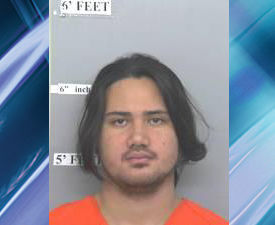HONOLULU — The Hawaii Supreme Court Friday reinstated the murder conviction of an Anahola man convicted of an execution-style killing at a beach park on the North Shore. Vincente Kote Kapika Hilario was convicted by a jury in 2013 after
HONOLULU — The Hawaii Supreme Court Friday reinstated the murder conviction of an Anahola man convicted of an execution-style killing at a beach park on the North Shore.
Vincente Kote Kapika Hilario was convicted by a jury in 2013 after a month-long trial for the Dec. 17, 2010 murder of Aureo Moore, 34. Prosecutors said Hilario shot Moore at Anahola Beach Park to prevent him from testifying in a robbery case.
“I am very grateful that the Supreme Court agreed with our arguments in this very important case,” said prosecuting attorney Justin Kollar. “As always, our thoughts are with the family and friends of Aureo Moore.”
In March, the Intermediate Court of Appeals vacated the Fifth Circuit Court decision, citing that the delay in trial was not properly excluded under the Hawaii Rules of Penal Procedure Rule 48.
“Rule 48 basically says that the state must bring the defendant to trial within 180 days from charge or arraignment, whichever is sooner,” said Ronette Kawakami, associate dean for Student Services at the UH William S. Richardson School of Law. “Certain periods are excludable from the computation. For example, anytime a defendant files a motion that is not related to bail. From the time of filing to the end of the hearing, that time is excludable.”
In his appeal to the appellate court, Hilario argued that the circuit court erred because it had not begun his trial within 180 days (six months) from the date of arrest, according to court documents.
Before Friday’s ruling, a time period between Sept. 17, 2012 and Dec. 20, 2012 was in question as to whether it should be included in the 180-day time limit.
Kollar presented arguments before state’s highest court in late July
“On appeal, Hilario argued that the time should’ve been charged to the state, and the ICA agreed,” Kollar said regarding the appellate court’s March ruling. “However, the Hawaii Supreme Court agreed with our position that the continuance was caused by the late alibi disclosures and therefore the continuance was reasonable and it was also correct to charge that time to the defense.”
Before the trial, Hilario’s defense team argued time after time that one witness, which whom they had filed a Notice of Alibi, was not actually an alibi witness, but someone who would testify to who had really shot Moore, records showed.
The state argued the contrary. It said the witness would provide testimony that would support an alibi defense, records show.
“We argued that the circuit court did not err by continuing the trial and did not err by charging the time to the defense for purposes of Rule 48,” Kollar said. “As the case approached trial, it became clear that Hilario was going to mount an alibi defense.”
The Notice of Alibi came two days prior to a scheduled hearing and the Sept. 17, 2012 trial date was pushed back to Jan. 7, 2013. On Dec. 20, 2012, Hilario filed a motion to dismiss based on violation of the Rule 48 HRPP.
On March 8, 2013, the jury found Hilario guilty of murder in the first degree, retaliating against a witness, intimidating a witness and bribing a witness on March 8, 2013. Fifth Circuit Court Chief Judge Randal Valenciano sentenced Hilario to life in prison without the possibility of parole later that year.
Hilario was said to have shot Moore multiple times at close range near Anahola Beach Park after bribing a woman with drugs and asking her to drive Moore to the site and drop him off, records said.
Hilario tried to flee on foot, but was later caught by police, arrested and arraigned.
Hilario had previously tried to dismiss charges for violation of Rule 48, but the Fifth Circuit Court denied it, and said that scheduling conflicts had been the reason the trial date had been pushed back, records said.
Hilario is incarcerated at the Saguaro Correctional Center in Arizona and is serving 10 years for felony firearms and drug charges in addition to the life without parole sentence.
The case will now return to the ICA for that court to address two other issues raised by Hilario on appeal: a question on the voir dire selection process where jurors were questioned at the bench and whether specific evidence presented to jurors at trial was in violation to his right to a fair trial.


